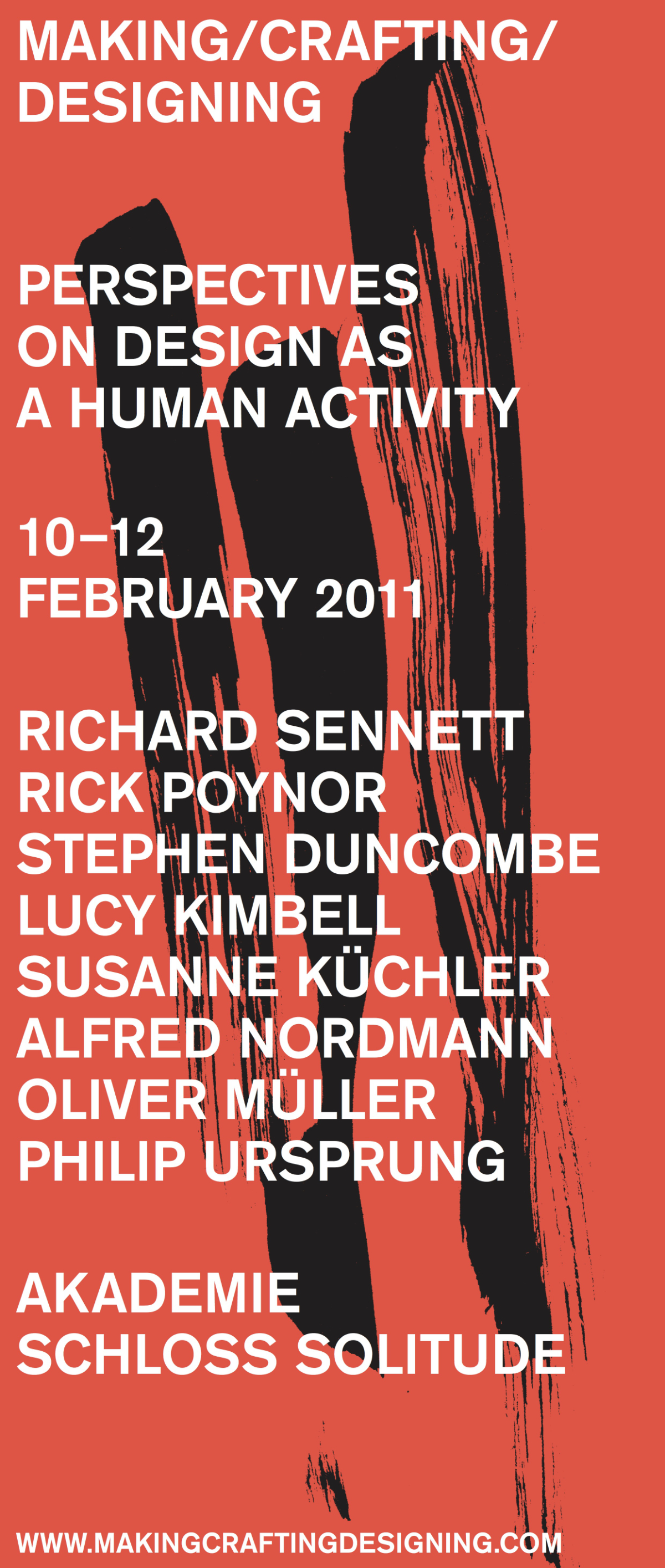
Making/Crafting/Designing: Perspectives on Design as a Human Activity
Symposium and Workshops
Akademie Schloss Solitude
Stuttgart, Germany
February 10–12, 2011
Humans are essentially makers of things. These material artifacts surround us; they form our environment and even form part of us. It is no longer possible to ignore that the world we live in is not a given but rather one that we make. Alongside this realization, the world itself has become increasingly makeable, for example, through genetic engineering, nanotechnology, and synthetic biology. As the resulting artifacts become increasingly complex, it has become crucial to understand the process and consequences of their creation. These operations can essentially be understood as design processes. Within an extended notion of design, almost all human activity is, to a significant degree, a design activity.
The symposium examines how this notion of design can be conceptualized and what the implications are for design as an academic discipline. An extended notion of design must, however, also be critically evaluated: if most artifacts are considered as being designed, how can unintentional processes and their material outcomes be accounted for? Within an investigation of human material culture, it is thus essential to distinguish the terms “making” and “designing.” While the former designates the production of material artifacts as a general human activity, the latter term indicates a more advanced form of making that involves planning, intentionality, and an awareness of consequences.
As a result, the notion of what constitutes design is narrowed to concern only “designed objects,” while the overall view, which concerns the process of making, is extended to include intended and unintended artifacts. This raises important questions about the role of design in human life. Who designs and for which purpose? How do we deal with responsibility for material artifacts and their intended or unintended consequences?

Workshop 1: Design as a Human Activity
Design has been described as “the conscious and intuitive effort to impose meaningful order” (Victor Papanek). In this sense, most human activities can be viewed as design activities. Yet there are various ways in which human production has been described, and thus, we would like to ask how design differs from making, crafting, or planning. Is design a special form of activity that requires distinct cognitive and/or cultural prerequisites? Or may all types of human making and doing be described as design? Furthermore, we might ask about the role these activities play in defining who we are: do we make ourselves by making things? And what happens when we start making ourselves?
Workshop 2: The Extended Notion of Design
An extended notion of design views the production of any artifact, whether material or non-material, as design. Accordingly, anyone who produces these artifacts—ranging from lifestyles and languages to politics and choices—is a designer. If this is the case, what contribution can be made by those who were formally educated as designers? Do they possess unique approaches, mindsets, or skills that could (positively or negatively) impact these new areas of design? What knowledge could formally trained designers gain if they were to investigate these areas? And more generally, what use is an extended notion of design?
Workshop 3: Design as a Humanistic Discipline
Design is fundamental to human life and has become increasingly important in a world characterized by rapid social, economic, and technological change. This circumstance necessitates a reevaluation of the designer's role and, correspondingly, design education. Should the latter shift its focus from professional development to adopt a more humanistic orientation? Should design education incorporate subjects such as philosophy, sociology, or the natural sciences? Would a humanistic education then produce better designers? Or does the current state of the world require more specialized designers?
Credits
Conference Chairs: Sarah Owens, Björn Franke
Conference coordination: Sarah Owens, Björn Franke
Logistics and Administration: Akademie Schloss Solitude
Design: Tim Giesen